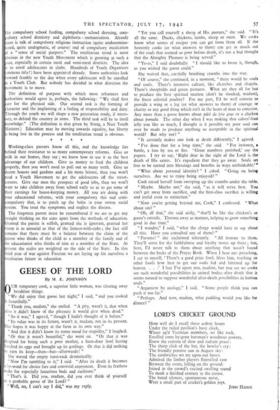GEESE OF THE LORD
By M. E. JOHNSON UR temporary cook, a superior little woman, was clearing away breakfast things.
"We did enjoy that goose last night," I said, "and you cooked t beautifully."
"Thank you, madam," she smiled. "A pity, wasn't it, that when ive it didn't know of the pleasure it would give when dead." "So it was," I agreed, "though I hadn't thought of it before." "Its value was in its future, wasn't it, madam, not in its present. ne hopes it was happy at the farm in its own way."
"And that it didn't know its name stood for stupidity," I laughed. "Or that it wasn't beautiful," she went on. "Or that it was espised for being such a poor mother, a barn-door fowl having atched its eggs and brought up its goslings. Or that it did nothing 0 earn its keep—then—but—afterwards! "
She waved the empty toast-rack dramatically.
"Now I'm tumbling to it," I said. "After its death it becomes a by-word for choice fare and convivial enjoyment. Even its feathers make for especially luxurious beds and cushions."
"That's it. Did you, madam, did you ever think of yourself as a probable goose of the Lord?"
"Well, no, I can't say I did," was my reply. "Yet you call yourself a sheep of His pasture," she said. "It's all the same. Ducks, chickens, lambs, sheep or oxen. We cooks know what scores of recipes you can get from them all. If the heavenly cooks (or what answers to them) can get as much out of the souls that seemed so poor before death, it's not a bad thought that the Almighty Pleasure is being served."
"Ye-es," I said doubtfully. "I should like to know it, though, as you wished the goose could."
She waived that,. carefully brushing crumbs into the tray.
"Of course," she continued, in a moment, "there would be souls and souls. There's intensive culture, like churches and chapels. There's sheepfolds and green pastures. What are they all for but to produce the best spiritual mutton (don't be shocked, madam), the finest celestial poultry? For my part, I'd be well content to provide a wing or a leg (or what answers to them) of courage or charity or any good thing which isn't in the heart of man to conceive. Any more than a goose knows about pile de foie gras or a chicken about panada. The other day when I was making that calves'-foot jelly you like so much, I thought is it possible my poor soul can ever be made to produce anything so acceptable in the spiritual world? But why not?"
"It certainly makes one look at death differently," I agreed.
"I've done that for a long time," she said. "For instance, a battle, a loss by sea or fire. 'Great numbers perished,' say the papers. I try to say, 'Right dear in the sight of the Lord is the death of His saints. It's expedient that they go away. Souls set free to be turned into blessings and benefits in ways unthinkable.'" "What about personal identity?" I asked. "Going on being ourselves. Are we to enjoy being enjoyed?"
Cook raised herself from sweeping up the crumbs under the table.
"Maybe. Maybe not," she said, "as it will serve best. You can't get away from sacrifice, and the first-class sacrifice is willing and joyful even to extinction."
"Now You're getting beyond me, Cook," I confessed. "What about sin?"
"Oh, all that," she said airily, "that'll be like the chicken's or goose's entrails. Thrown away as manure, helping to grow something good in due time."
"I wonder," I said, "what the clergy would have to say about all this. Have you consulted any of them?
"Parsons! " she exclaimed tolerantly. "All honour to them. They'll serve for the faithfulness and loyalty stores up there ; but, here, I'd never talk to them about anything that wasn't found between the backs of the Prayer Book. When I hear one preaching, I say to myself, 'There's a good prize fowl, bless him, teaching us other fowls how best to get our souls fed and fattened up for heaven. . . I fear I've upset you, madam, but you see we cooks see such wonderful possibilities in animal bodies after death that it seems natural to suppose wonderful after-death possibilities in human souls."
"Argument by analogy," I said. "Some people think you can push it too far."
"Perhaps. And now, madam, what pudding would you like for dinner? "


























 Previous page
Previous page